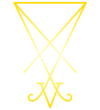Solon
Hellenic Sage
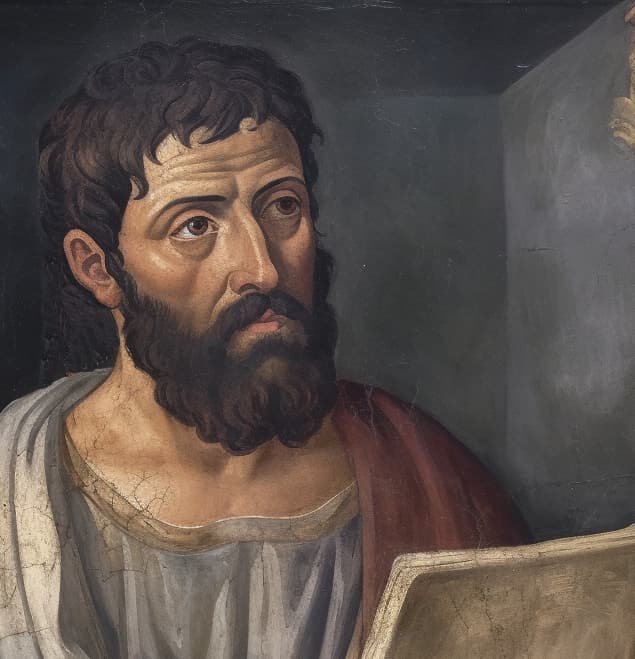
Solon is the father of Law as we know it, and synonymous with the foundation of proper legal practice. He was one of the most important legislators and reformers of Athens; his life and works led to legal and cultural reforms that radically changed the political, economic, and social structure of that city-state.
He is known as a statesman who laid the foundations of Athenian democracy and made important arrangements to ensure justice and social balance. Solon’s story is one of transformation from an economic system based on bondage to a society where the first seeds of democracy were sown.
ARISTOCRATIC SCION
He was born into an aristocratic dynasty called the Pisistratids, though it is thought the branch he belonged to was not particularly wealthy. One of his relatives was Pisistratus, a powerful political figure who later became infamous as a tyrant. However, in the youth of the would-be tyrant, Solon adored Pisistratus and served as his mentor.
Coming from the established rulers of Athens, Solon was brought up among the traditional nobility, yet he came to adopt more democratic values and tastes. Despite his aristocratic background, Solon is known for reforms focused on improving the welfare of the people and ensuring justice in social affairs. He was known to have been an educated young man and gained wealth through trade, a rather untraditional pursuit for an aristocrat, which marked him out with some dubious distinction.
Solon also achieved an illustrious military career. He was the leader of the Athenian army during the major war against Megara over the island of Salamis. A significant slew of victories in this war can be attributed to his valor. At one point, after repeated failures against Megara, it was nearly made a capital offense in Athens to even mention the name of Salamis.
The young commander was affronted by this, being an advocate of free speech and seeing the decree as cowardly. Mustering his poetical skills, he delivered a grand speech to inspire the Athenians to fight for the island in the name of Athena. The passion of his speech led the shocked leaders of Athens to rescind the law, placing their trust in his judgment.
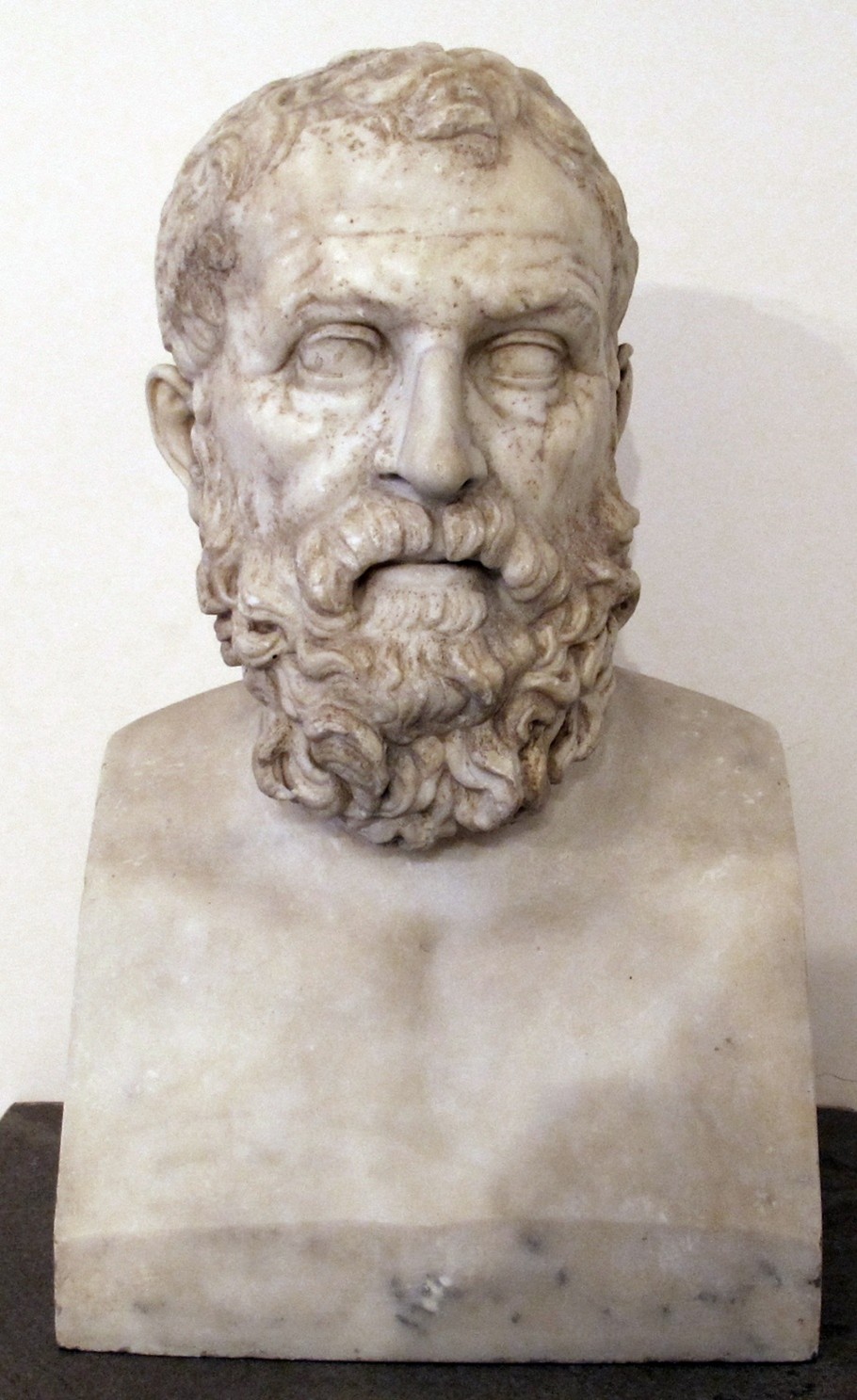
During his time as commander, Solon came to several realizations. Serving among the ranks, he observed class tensions that weakened Athenian society, issues that also affected military cohesion. Health problems and other hardships among the lower orders revealed deeper systemic inequalities. Even then, the city-state heavily relied on its navy to solve problems, a dependence he warned could threaten Athenian freedom.
Yet Solon could be ruthless to the enemies of Athens, devising schemes to undermine the city’s foes. In these endeavors, he showed he was, after all, a Pisistratid.
At the end of the conflict, the powerful archons of Sparta presided over the decision of whether to award Salamis to Megara or Athens. This was partially based on weighing historical evidence of settlement by each city. Solon’s poetic and rhetorical brilliance, along with his bravery and sincerity, swayed the stony-faced Spartans into awarding the island to Athens.
Solon was also famous as a poet and writer. His poetic treatises on moral values, justice, and political reform contain instructions that prioritize the welfare and order of society. His esteemed talent as a poet supported both his political career and his public reputation as a businessman. In his poetry, he delivered strong messages to the Athenians about the kind of society he wished to create.
These works are important for understanding the thinking behind Solon’s reforms, as his writings reflect their ideological underpinnings. For example, he criticized the gap between the rich and other segments of society; the sentiments in his poetry illuminate the steps he took to enforce meaningful parity.
He was also known to have engaged in various occult rites, such as the Delphic Mystery of Apollo. Many facets of his life were tied to his worship of Apollo, whose ethics mirror much of Solon’s personal character and ambitions as a great legislator and philanthropist.
INTERVENTION IN ATHENS
His political career began at a time when Athens was experiencing internal turmoil and severe social problems, primarily due to the stratification of wealth and the creditor/debtor relationships dominating society.
Athens at the time was ruled by aristocrats and the wealthy. Many citizens, particularly in Northern Attica, were being driven into poverty, and farmers resented the heavy debts forced upon them. Many from this region, crucial to Athens’ defense against Sparta and Megara, had fallen into slavery due to unpaid debts and lost their land, becoming bound to creditors who were theoretically meant to protect their interests but in reality often abused them. This was causing severe polarization and unrest, with Athenian society teetering on the brink of major economic and social crisis.
This situation was exacerbated by the Laws of Drakon, which had long held sway in Athens and were notoriously harsh (from which the English word “draconian” derives). These laws sent many people into debt slavery on the flimsiest pretexts, not just the poor. Large portions of society resented these laws, viewing them as intrusive, unjust, and destructive.
By this point, exploitation by the aristocracy and the prevalence of debt bondage had pushed Northern Attica to the verge of revolt. A civil war seemed imminent. At this moment, both the rich and the poor turned to Solon to solve the crisis. It was believed, due to his high-mindedness and engagement with all facets of society, that he would be a fair and balanced legislator who could protect the rights of all.
REFORMS AND LAWS
Solon was elected archon (chief judge) to solve the social and economic problems in Athens. He immediately took to the task of making balanced adjustments that would satisfy all segments of society and give a distinct character to the Athenian state. His reforms quickly led to radical changes in the political and social structure of Athens.
Solon’s aim was to create a distinctive character for Athens, different from that of other Greek states, without destabilizing the situation. While he admired Lycurgus’ reforms, he abhorred the system of the helots and how parity among the Spartans had been achieved through their subjugation. Therefore, Solon set about leaving the affairs of the magistracy to the upper classes, while enhancing participation in society for others.
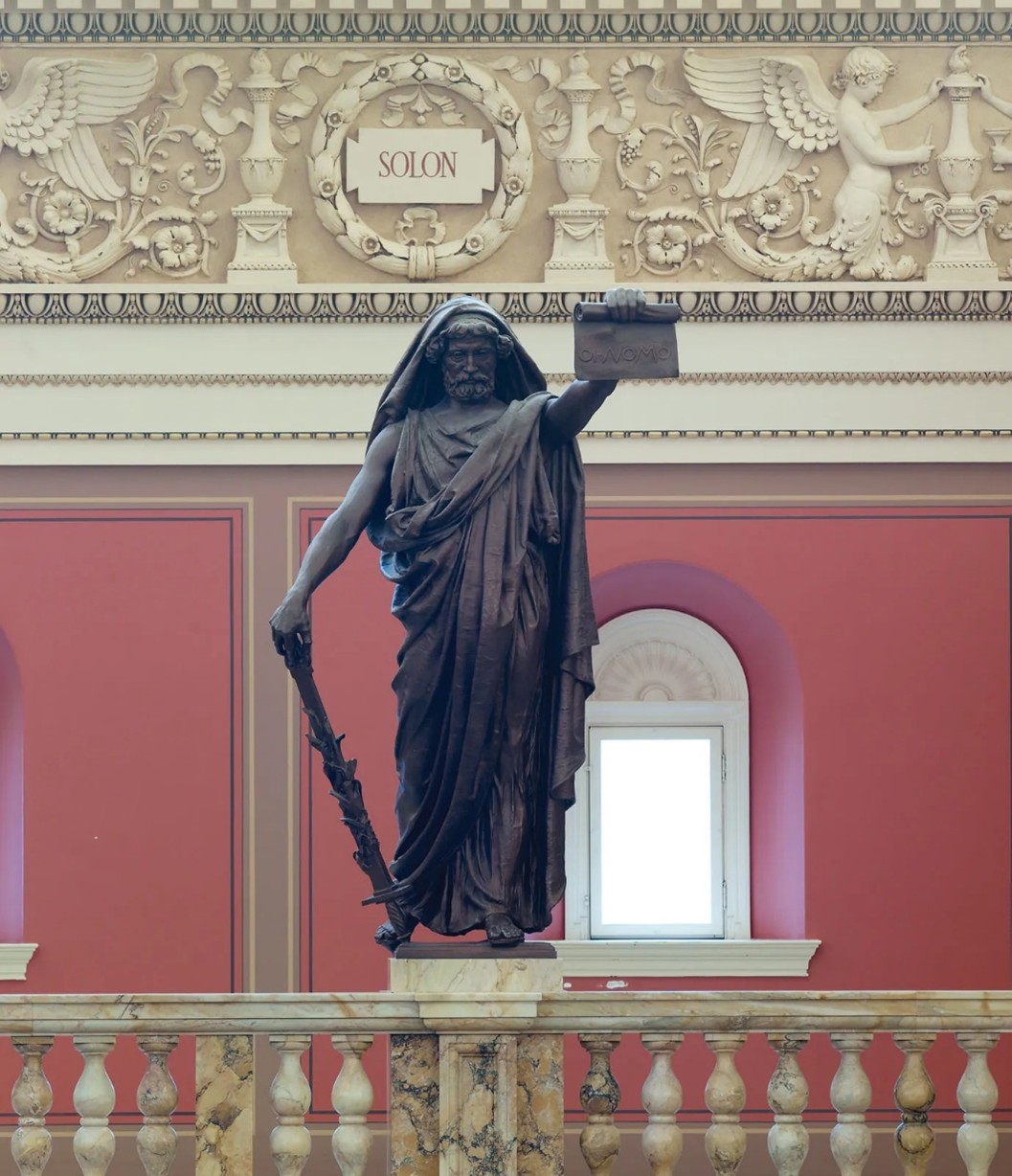
In concordance with the character of Apollo, Solon thought deeply about balance, growth, and the factors that could lead to prosperity in the life of a citizen. War-like societies of the time, such as Sparta and Thebes, were seen by him as limited, characterized by oligarchical and totalizing systems that left little room for individual initiative. Solon believed in an idea of Athens where culture, leisure, science, the exercise of religion, and other facets of expressing citizenship could blossom, as long as certain liberties were enshrined and the interests of all classes were negotiated. Of course, this still came with a condition: male citizens had to pay their proper dues in military service.
- SEISACHTHEIA
One of Solon's most famous reforms was the debt relief law called Seisachtheia, or “removal of burden ordinance.” With this reform, he decreed that Athenians could not be slaves unless they were criminals and deemed appropriate for servitude as punishment. This was one of the measures that ensured, for centuries, that the word Athenian was synonymous with freedom.
He therefore freed Athenians who had become slaves due to debt bondage and recalled as many Athenian slaves from foreign states as possible. It also allowed those who had lost their land to regain possession of it. Solon abolished forms of serfdom that had recently appeared in Attica. This reform ended debt slavery and enhanced debt relief for the poor. To cultivate patriotism, Solon also banned the pledging of land for debt.
Solonian enhancements in this area brought great relief to society and created an expansionist ethos in Athens, similar to how anti-slavery efforts galvanized the British many years later.
- BALANCE OF CLASSES
Solon divided society into four classes to balance political power in Athens. These classes were based on the economic power and income of the citizens:
- Pentakosiomedimnoi: The richest class, large landowners.
- Hippeis: Wealthy farmers, those who could afford to serve as horsemen in war, hence the “Knights” of Athenian society.
- Zeugitai: Middle-class farmers, typically serving as infantry soldiers.
- Thetes: The poorest class, landless peasants and laborers.
To balance these classes, which carried the character of castes still present in Hindu lands today, Solon also made political participation class-based. The richest could run for the highest government posts, but lower classes were also given a certain role in politics. Thus, Solon tried to ensure that not only the rich but also the wider societal elements, related to the basic nature of providing for Athens, participated in governance.
- STRENGTHENING THE PEOPLE'S COUNCIL AND THE COURTS
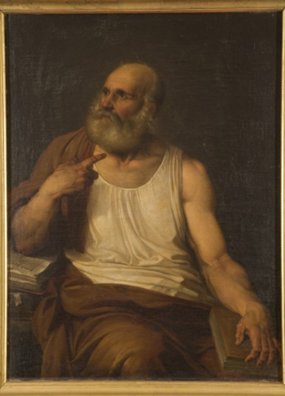 Solon, Francisco Hayez
Solon, Francisco HayezThe archon strengthened the popular assembly and the courts to establish a more democratic structure in Athens. The People’s Assembly (Ekklesia) became a body all male citizens could attend and where they could have a say in important state matters such as declaring war. This led to increased political participation among the people.
Solon also gave the people a direct say in the justice system by establishing popular courts called Heliaia, which could oppose the decisions of the Areopagus, a council of nine typically made up of Athens' foremost citizens. Additionally, he gave citizens the right to sue anyone, including rulers of the state. Citizens could now oversee the implementation of laws and participate in trials.
- NEW CONSTITUTION
Solon revised the laws in force in Athens and drafted a new constitution. This constitution had a structure that balanced the rights of all classes in Athens according to the weight of their role. Solon’s reform aimed to achieve justice in Athens. The laws were designed to protect everyone’s interests, and Solon forbade them from being changed for ten years to ensure they would remain valid for a long time.
- ECONOMIC REFORMS
Solon's reforms were not limited to the political and social spheres; economic reforms also played an important role. He took various measures to revitalize Athens' trade and agricultural economy. For example, Athenian citizens were banned from exporting agricultural products except olive oil. This was intended to strengthen Athens’ foreign trade while protecting the domestic supply of agricultural goods.
In addition, craftsmanship and trade were encouraged to improve the economic welfare of the poor and to enable them to earn a living independently.
LATER YEARS
After implementing his reforms, Solon announced that he would stay away from Athens for ten years to observe how the reforms would take hold. He also wished to make himself unavailable to threats or bribes that could alter any aspect of his laws. During this time, Solon visited various countries, such as Egypt, where he met the Pharaoh Amasis II, and he engaged once more in trade. When he returned home, he found that his reforms had not been fully implemented.
Despite Solon’s reforms, internal strife continued in Athens, and the tyranny of Peisistratos began. Instead of cooperating on the reforms, all classes felt their personal interests were being thwarted. They were unable to see the general benefit of the reforms to Athens itself, which was rapidly growing in power and influence.
When Solon returned to Athens in his old age, he found that his reforms had still not been fully realized. He moved against Peisistratos’ abuse of power, protesting until the end and creating an impasse between the two, urging the populace to resist whatever Peisistratos did. Nevertheless, out of respect, Peisistratos remained faithful to the general outlines of Solon’s laws and preserved most of his reforms, which persisted in Athens until the end of its independence. During this period, Solon remained in the background of the city-state but continued to be held as a sage whose ideas and advice were sought by those in need.
Although the exact year of Solon’s death is not known, it is estimated that he died around 558 BC. Even after his death, the Athenian people held him in high esteem. Solon was considered a cornerstone in the development of Athenian democracy. His reforms laid the foundation for the democratic system that followed the tyranny of Peisistratos and became one of the most important symbols of justice, law, and social order in Athens for centuries.
Solon became so legendary that many of his sayings were directly inscribed in the Temple of Apollo at Delphi.
FOUNDATIONS OF DEMOCRACY
His laws and reforms formed the cornerstones of Athenian democracy and continued to influence the Greek world and beyond for centuries. Solon, on one hand, limited the power of the aristocracy and granted political rights to a wider mass of people. On the other hand, he placed great importance on the preservation of social balance. Therefore, his reforms were neither fully democratic nor fully aristocratic. However, this balance paved the way for the preservation of social peace and the development of a democratic structure in Athens.
Solon laid the foundations of Athenian democracy, especially by strengthening the popular assembly and the courts. His reforms were later expanded by Kleisthenes and Pericles, and a full democratic system was established in Athens. This process initiated by Solon was later taken as an example by many other city-states in the Greek world.
RULE OF LAW
His reforms were based on the rule of law and the provision of justice. His adjustments to the legal system aimed to ensure both public participation in governance and the equal distribution of justice. This served as a model for the developing judicial system of Athens. Eventually, Solon’s understanding of justice and equality became an important reference point in the philosophy of law in later periods.
In the all-important Athenian prytaneia, where prominent individuals assembled, his laws were inscribed on cylinders known as axones.
Wide in scope and vision, his ideas and reforms had great influence beyond the Greek world. The Roman Empire and later European legal systems were influenced by Solon’s laws. In addition, his democratic principles played an important role in the development of modern legal and political philosophy.
Solon’s name has been revered in Athens and throughout the Greek world for centuries. Athenians saw him as a symbol of justice, wisdom, and balanced government. His reforms are considered the first step in the processes that ushered in the Golden Age of Athens and have been emulated by philosophers, thinkers, and legislators throughout history.
He is honored with statues in Athens, and his name is counted among the most important leaders in Greek history. His legacy centers on the principles of democratic values, social justice, and the rule of law, which left a lasting mark on both Ancient Greek and world history.
Solon’s story is one of the best examples of how a statesman can influence society not only in his own time but also in the future. His reforms, based on justice and social balance, reshaped the political and social structure of Athens, and also set a precedent for all of European civilization and beyond. For this reason, Solon continues to be remembered as one of the most important and respected figures in Athenian history.
BIBLIOGRAPHY
Histories, Herodotus
Life of Solon, Plutarch
Lives and Opinions of Eminent Philosophers, Diogenes Laertius
CREDIT
Thersthara
[TG] Karnonnos

 አማርኛ
አማርኛ العربية
العربية বাংলা
বাংলা Български
Български 中文
中文 Čeština
Čeština Dansk
Dansk Deutsch
Deutsch Eesti
Eesti Ελληνικά
Ελληνικά Español
Español Français
Français हिन्दी
हिन्दी Hrvatski
Hrvatski IsiZulu
IsiZulu Italiano
Italiano 日本語
日本語 Kiswahili
Kiswahili Magyar
Magyar Македонски
Македонски नेपाली
नेपाली Nederlands
Nederlands فارسی
فارسی Polski
Polski Português
Português Română
Română Русский
Русский Slovenščina
Slovenščina Suomi
Suomi Svenska
Svenska Tagalog
Tagalog Türkçe
Türkçe